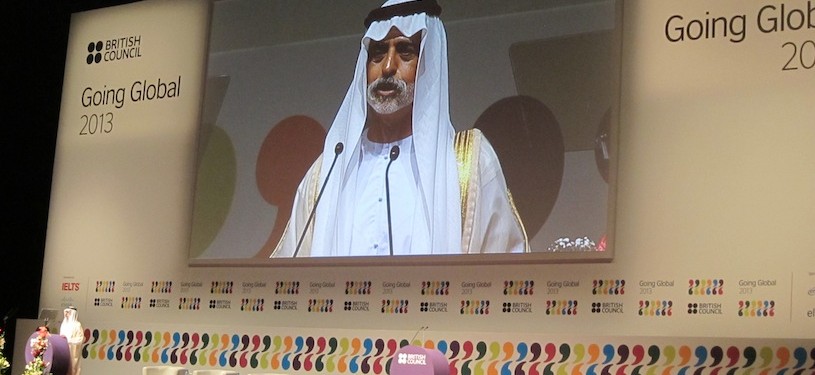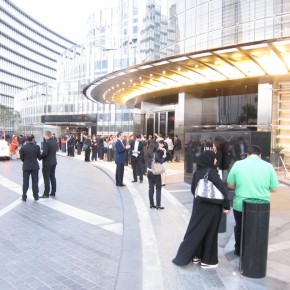The ever-improving Going Global, the British Council’s conference for leaders in international education, convened in Dubai this week, the “crossroads of the world”. Its central theme was ‘Knowledge-based economies for 21st-century nations’, and the conference threw up dynamic debate over the need for economies that are international in scope, at pace with technological change and offer education in line with labour market needs.
News and business analysis for Professionals in International Education
Have some pie!
GG13: build digital, industry-linked knowledge economies
 HE Sheikh Nahayan arrived by red carpet, and spoke intelligently on international education as "more than the sum of its collective parts"
HE Sheikh Nahayan arrived by red carpet, and spoke intelligently on international education as "more than the sum of its collective parts" The event was officially opened by His Excellency Sheikh Nahayan Mabarak Al Nahayan, UAE Minister of Higher Education and Scientific Research, who spoke at length about the world’s “unprecedented connectivity”, and the overseas education partnerships that UAE has formed as it engages in the global economy.
The UK’s Universities Minister, David Willetts, also inaugurated the conference with a nod to the UK’s rising involvement in online delivery of learning via Futurelearn, and with the news that the British Council is to partner with the platform – lending its global network of offices to the possibilities presented by online delivery.
“MOOCs should not be seen as a replacement but as a place to ignite the imagination”
Online learning, and its newest incarnation, the MOOC, were hot topics throughout the conference, with the Open University’s Vice Chancellor, Martin G Bean (one of the liveliest speakers), saying that ‘click and mortar’ was the future shape of learning, and all universities needed to adapt. “Don’t confuse mode with quality of teaching…” he said. “MOOCs should not be seen as a replacement but as a place to ignite the imagination.”
Transnational education (TNE) was another focus – inevitable given the conference venue in the UAE, home to 52 universities for a population of 1.2 million and cited in one study published this week as the fourth-most popular study destination across the MENA and Asia region.
Tengku Azian Shahriman, of the Malaysian Prime Minister’s Department, talked about her country’s seven foreign branch campuses, 20 public and 37 private universities, as well as its still developing Iskander EduCity. However, the government is pulling back (and enrolments have fallen), only allowing new ‘tier one’ IBCs and calling a moratorium on all else.
Nevertheless, with new hubs being developed in Botswana and Mauritius to cite a few, TNE is a growing trend. Will Archer of research firm i-graduate revealed student feedback, showing that 69% of TNE students in the Student Barometer survey said they would recommend TNE to others.
A lack of endorsement from governments, TNE’s “new” status, and a lack of research facilities at IBCs were all suggested as reasons for an endorsement rating lower than that of students studying in an institution’s home country – or elements that needed improvement.
“We need to be more agile and more empowered by senior management to change”
The need for universities to align with employment needs was another common theme. Commenting on today’s higher education, Dr Francisco Marmalejo of the World Bank said, “The market drives needs, government tries to interpret, universities respond often unsuccessfully—and everyone blames each other.” Kari Branjford of HE ITC provider Ellucian, cited a worrying study showing 72% of universities think they are preparing their students for their first jobs while just 45% of employers think the same.
There were calls for business, government and HE to forge closer bonds to deliver industry-relevant programmes. Professor John Grainger of Murdoch University’s campus at Dubai International Academic City spoke about delivery of programmes focused on skills needs for Dubai’s booming economy.
“We need to be more agile and more empowered by senior management to change,” he said. “We’ve got to change to meet needs of students and employers, but like a battleship, senior management can be hard to turn around.”
It was the need for collaboration that summed up Going Global: between countries, vocational and tertiary, online and offline, and government, education and business. This is the best way to foster and improve international education, which as HE Sheikh Nayahan aptly put it is “an achievement more than a sum of its collective parts”.
Still looking? Find by category:




2 Responses to GG13: build digital, industry-linked knowledge economies